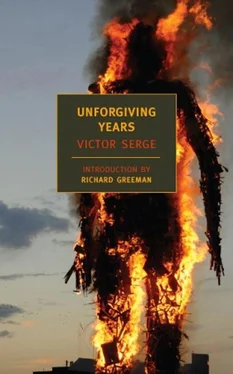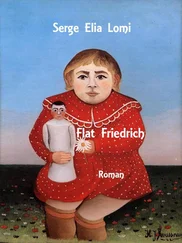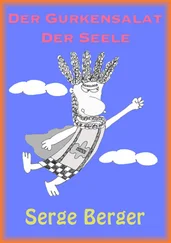The death of consciousness is the central theme of Unforgiving Years , written at a time when Serge was meditating on his own death and on that of the planet — conceivable since the explosion of the “cosmic weapon” of August 4, 1945. “The most tragic thing about death, the most unacceptable thing for the mind,” Serge noted on the passing of his friend Fritz Frankel, the cultivated psychoanalyst and fellow Comintern veteran, “is the total disappearance of a spiritual greatness built out of experience, intellectual elaboration, knowledge, and understanding, much of it incommunicable.” Serge’s Notebooks continues: “The individual strives to gain enduring existence for himself by the fame of his activity (accomplishing a mission, pursuit of glory; for the writer and the reformer, the need to capture the moment, to express, to teach; the need to be integrated with history).” [20] 20. Victor Serge, Carnets (Arles: Actes Sud, 1985). ß
Serge and the protagonists of Unforgiving Years live by this ethos, inherited from the nineteenth-century Russian revolutionary intelligentsia and derived from the Hegelian (and Marxist) sense of “Consciousness” as a historically active thing in itself, the world spirit unfolding through time, the self-discovery of human intelligence as the dialectic of freedom, the meaning of life. “The sense of history,” noted Serge in 1944, “is the consciousness of participating in the collective destiny, in the constant becoming of men; it implies knowledge, tradition, choice, and finally, conviction, it demands a duty — for, once you know, once you have understood, once you have made out the possible courses, you must live (act) according to that understanding.” [21] 21. Serge, Carnets .
How then to live outside of history, outside of the purposeful struggle, outside (for agents like D and his comrades) the Party?
Each of Serge’s four protagonists tries to answer (or to avoid) that question in his or her own way. In Paris we are first introduced to secret agent D (alias Sacha, alias Bruno Battisti) on the verge of his “resignation” from the Service; then we meet D’s lover and protégée Nadine (alias Noémi); both are connected with a young French Communist, a painter named Alain. Finally, we catch a glimpse of Daria — D’s female alter ego — a comrade he has known since she was a girl fighter in the Russian Civil War. The plot, which is not easy to follow, is woven through their various encounters in the four sections of the novel.
In the Paris segment, “The Secret Agent,” D and Nadine prepare their escape to parts unknown while Daria refuses D’s offer to escape with them, preferring to return to Russia and probable arrest. In the second section, “The Flame Beneath the Snow,” Daria is called back to wartime intelligence service (after deportation to Kazakhstan) during the siege of Leningrad. In the final pages of the German section, “Brigitte, Lightning, Lilacs,” Daria resurfaces (along with Alain) working for the Berlin underground as a nurse under the name of Erna. In the last, tragic movement, “Journey’s End,” Daria finds her way to Mexico where she is reunited with D and Nadine/Noémi.
Daria is thus the central protagonist connecting the four sections of the novel. She is also the only character in this oddly allusive novel for whom one can construct an actual “biography” (albeit only by patching together allusions and flashbacks scattered throughout the work). If D, the introspective male protagonist, poses the “problems of consciousness” in the first and final chapters of the novel, Daria is Serge’s active protagonist. She is the hero who struggles against fate, the warrior who fights for humankind, the traveler whose quest takes her across war-torn Europe from Russia to Mexico. She is also the lover who experiences passion and grief, the great-souled woman who is granted a rich inner life. Daria’s diary and soliloquies explore erotic love, grief, and anger from the viewpoint of a distinctly female sensibility. Indeed, Daria represents a creative breakthrough for Serge the novelist, whose previous novel, The Long Dusk , was marred by somewhat clichéd female characters generally seen from without and in relation to male heroes (as wife, daughter, sister, lover).
In the opening pages of Unforgiving Years , we sense rather than understand the futility of prewar Paris. Defeat is in the air. In this sinister atmosphere, everything seems base and livid: the light, the hotels, the streets, the people. Serge’s secret agent is ambivalent about the doomed French capital, admiring the freedom, the easy way of life, even the decadence and cynicism. Crossing place de la République, D looks up at the statue: “a solitary, decorative, and disarmed Marianne, stood ignored by the streams of people following their interwoven pathways around her feet. And no one gives a shit! That’s one way — perhaps the most genuine way — of being republicans…” This self-absorbed Paris will soon join Serge’s other cities — Barcelona, Leningrad, Berlin — as “fissured icebergs drifting toward naked dawns” in the poem that adorns the title page of the second movement.
Readers of Serge’s earlier novels will find it surprising that the characters in Unforgiving Years rarely discuss politics, and there are few precise allusions to contemporary events . Do we even know the date of the Paris episode? Has Franco already won the Spanish Civil War? Are we before or after the Munich crisis and the Stalin-Hitler Pact? Whereas Serge’s earlier novels may be read as witness-chronicles of the revolutionary struggle, this last novel is denuded of political and historical specifics. If Serge seems to have deliberately set aside chronicle to concentrate on symbol and atmosphere, perhaps he is inviting us to read the novel on the level of meta-politics, of the history of consciousness seen from a geological, biological, evolutionary perspective.
Serge hints he is up to something of the kind through the device of a “book within a book.” Deported to a tiny Kazakh village, Daria keeps a journal, which she knows will be studied by the local GPU chief. To protect herself and her comrades, she must censor out all compromising names, dates, places, and events, and this “literary constraint” obliges her to focus on her feelings and sense impressions as she relives the memories of her life with physical intensity. The lyrical texts that result express her intimate feelings of erotic love, anger, and grief recollected in tranquillity. The author then slyly pats himself on the back for this fictional tour de force when the cynical GPU chief compliments Daria on the literary qualities of her journal — before advising her to burn it. It is difficult not to see Daria’s journal as a metaphor for Serge’s self-censored novel. In his Notebooks he remarks: “Curious to observe that I am writing at the present moment, in this free country of America, like the Russians were writing around 1930 when the last spiritual freedom was expiring there.”
As Serge was writing Unforgiving Years , the dark shadows of Hiroshima, Auschwitz, and the Gulag were casting question marks over the future of civilized human society, indeed of the planet itself. Serge, like Gramsci, responded to this radically new historical situation with “pessimism of the intellect, optimism of the will.” Serge’s willed optimism came to the fore in an argument with Dwight Macdonald, whose belief in socialism had been shaken by the threat of the A-bomb: “It is possible,” Serge admits, “that it all must end via atomic destruction of this terrestrial sphere, as Anatole France foresaw in the final chapter of Penguin Island . But this is not at all a certainty. And it seems less probable, rationally, than the proper organization of a society in which atomic energy will contribute to ending the last slavery, that of hard work. As long as this possibility-probability continues, isn’t it our job to push in that direction?” The same optimism has inspired generations of readers of his Memoirs of a Revolutionary , where he sums up:
Читать дальше












